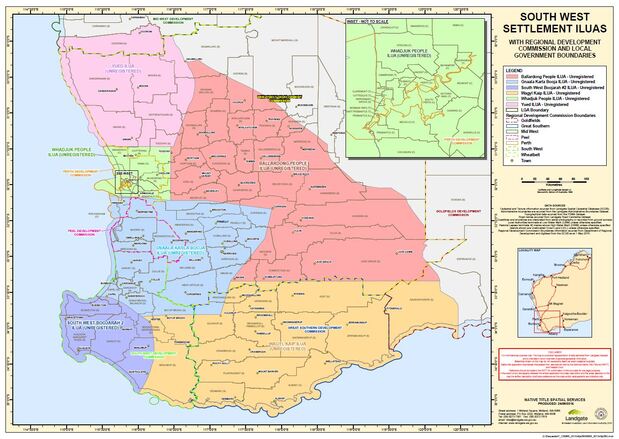The South West Native Title Settlement (Settlement) is a landmark native title agreement for the State of Western Australia which will resolve native title across the South West of Western Australia. The Settlement will provide an opportunity for the WA Government to work in partnership with the Noongar Native Title Agreement Group to improve the economic, social and cultural outcomes for the Noongar community. To learn more about the Settlement visit the Department of the Premier and Cabinet’s website.
Indigenous land use agreement
On 8 June 2015, the six Indigenous Land Use Agreements (ILUAs) comprising the Settlement were executed by the WA Government, the South West Aboriginal Land and Sea Council and the relevant Native Title Agreement Groups: Yued, Whadjuk People, Gnaala Karla Booja, Ballardong People, South West Boojarah #2, and Wagyl Kaip & Southern Noongar groups.
On 17 October 2018, the Native Title Registrar registered all six ILUAs under s. 24CK(1) of the Native Title Act 1993 (Cth). This milestone is a significant step towards commencement of the Settlement. However, applications seeking judicial review of the Native Title Registrar’s decisions to register the six ILUAs were subsequently lodged with the Federal Court, and will need to be heard and determined before the ILUAs are conclusively registered and the Settlement can commence. See the Department of the Premier and Cabinet's website.
Future act regime
The future act provisions of the Native Title Act 1993 (Cth) will continue to apply over the Settlement areas until the ILUAs are conclusively registered and the Settlement has commenced. The future act provisions will cease to operate in the six ILUA areas 30 business days after Settlement commencement..
The department's Tengraph system has been updated to show each of the six ILUA areas.
Noongar standard heritage agreements
From the date of their execution on 8 June 2015, the Settlement ILUAs bind the WA Government to use an agreed heritage template, the Noongar Standard Heritage Agreement (NSHA), when conducting Aboriginal heritage surveys in the ILUA areas (unless there is an existing heritage agreement). The NSHA is also the default heritage agreement for Industry (see below).
The NSHA provides parties with a framework for addressing aboriginal heritage management obligations, and the conduct of Aboriginal heritage surveys, where required, facilitating compliance with the Aboriginal Heritage Act 1972 and Regulations where a planned land-use activity may impact an Aboriginal site.
Where an Activity Notice is required under clause 8.2 of the NSHA the Activity Notice template should be used.
Please see the Department of Planning, Lands and Heritage website for the revised figures for rates of payment to Aboriginal Heritage Consultants under the NSHA.
Grant of petroleum tenure situated over the south west native title settlement area - heritage condition of title
From 8 June 2015, the Department of Mines, Industry Regulation and Safety is bound to apply the heritage condition prescribed at Clause 18 of Schedule 10 of each ILUA, upon grant of petroleum tenure. The condition requires that tenure holders must enter into an Aboriginal Heritage Agreement or a NSHA with the relevant Native Title Agreement Group before any rights can be exercised. The registered title holder must provide a Proponent Statutory Declaration (as per Annexure U to the ILUAs) as evidence of compliance of that condition.
The condition provides that if the tenure holder and the relevant Native Title Agreement Group (currently represented by the South West Aboriginal Land and Sea Council) fail to reach agreement on an alternative Aboriginal Heritage Agreement within 20 business days of the commencement of negotiations, the tenure holder must execute and enter into a NSHA subject only to any necessary modifications in terminology required for the tenure (ie in the form contained here).
Further information
Further information on the Settlement, including maps, boundary descriptions, and next steps can be found on the website of the Department of the Premier and Cabinet (DPC). Further information and advice about the Aboriginal Heritage Act 1972 and the Noongar Standard Heritage Agreement, including current templates can also be sought from the Department of Planning, Lands and Heritage (DPLH).
The South West Aboriginal Land and Sea Council (SWALSC) website also contains information on the Settlement and links to broader Noongar resources.

